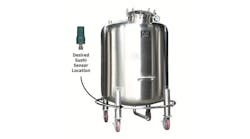What is homeland security? How does it affect the way of life of the American people? The U.S. Department of Defense "Homeland Security" site, www.defenselink.mil/specials/homeland, provides some food for thought.
The Department of Homeland Security (DHS) is the government agency charged with protecting the internal security of the United States. The "READY.GOV" Web site, www.ready.gov, provides guidance about what citizens should do to prepare for the threat of a terrorist attack.
Some people believe that the power of DHS, the current mood of the country and the international situation could make for a dangerous mix ," leading to abuse of power and the curtailment of civil liberties. Whole cities from Cambridge to Berkeley are viewing law enforcement under the guise of the USA Patriot Act of 2001 ("Libraries and the Patriot Legislation" Web site, www.ala.org/washoff/patriot.html) as a threat to civil rights ("abc News.com," http://abcnews.go.com/sections/us/DailyNews/usapatriot020701.html).
Security and the chemical industry
Security concerns within the United States have centered not only on individual risk mitigation, but also on that of entire industries. Both the chemical industry and municipal drinking water facilities have been under scrutiny because terrorists potentially could use their operations as "weapons of mass destruction."
The chemical industry, therefore, has taken a number of steps to beef up security since Sept. 11, 2001. In October 2001, the American Chemistry Council (ACC, www.amercianchemistry.com), the Synthetic Organic Chemical Manufacturers Association (SOCMA, www.socma.com) and the Chlorine Institute (www.cl2.com) issued "Site Security Guidelines for the U.S. Chemical Industry (www.socma.com/PDFfiles/securitywork shop/SecurityGuideFinal10-22.pdf). Through the Responsible Care initiative, both ACC and SOCMA adopted a seventh Code of Management Practice that requires member companies to engage in specific security practices, including initial site prioritization and site security vulnerability assessments (see www.responsiblecaretoolkit.com/security_guidance.asp and www.socma.com/Products/Vulnerability Analysis.htm).
Cybersecurity
Physical site security is not the only concern of individuals and industry. The World Wide Web and the larger Internet have elements of both good and evil. The evil elements play on known operating system vulnerabilities to gain access to sensitive data and wreak havoc on an otherwise peaceful computing environment.
The "SANS/FBI Top 20 List" Web site details the 20 most critical internet security vulnerabilities at www.sans.org/top20. The site's content is an understandable, prioritized list of vulnerabilities that require immediate remediation. It includes step-by-step instructions for handling vulnerabilities, as well as links to additional information for correcting network and computer operating system security flaws.
To address industry-related cybersecurity concerns, a group of chemical industry trade associations recently formed the Chemicals Sector Cyber-Security Program, which came out of the Chemicals Sector Cyber-Security Strategy
(www.pcis.org/getDocument.cfm?urlLibraryDocID=37). The Chemical Industry Data eXchange (CIDX, www.cidx.org) recently launched the Cyber-Security Practices, Standards and Technology Initiative to support the overall Chemicals Sector Cyber-Security Program.
Avoiding intrusion
With every computer connected to the Internet comes the potential of unwanted intrusion. Gibson Research Corporation (http://grc.com) offers Shields UP!, an Internet connection security analysis (https://grc.com/x/ne.dll?bh0bkyd2), to test the security of your computer. The tests will report to you what information is available to the Internet from your machine.
If you have a Web page or you use a firewall on your computer that logs attempted intrusions, you might like to know your "visitors." The log usually will show the Internet Protocol (IP) number address. You can use the IP number with "Try it" (www.networldmap.com/TryIt.htm) to view the geographic location of the server from which the IP number originates. The location page comes from Geobytes (www.geobytes.com), a company that supplies content localization technology. A geophrase greeting code you can use on your own Web page is available at www.geobytes.com/GeoPhrase.htm. A GeoSelect demo (http://test.geoselect.com/GeoSelectDemoWithFlash.html) gives an idea how the system works.
Wireless networking technology (see the Vicomsoft site at www.vicomsoft.com/knowledge/reference/wireless1.html) adds another intrusion risk because the wireless transmitter broadcasts over an area ," much like a radio.
The "Net Stumbler" site, www.netstumbler.com, is dedicated to wireless networking technology and security. The site includes forums, a national map of wireless networks and a database.
Hodel is
Chemical Processing's Internet columnist. Contact him at [email protected].
